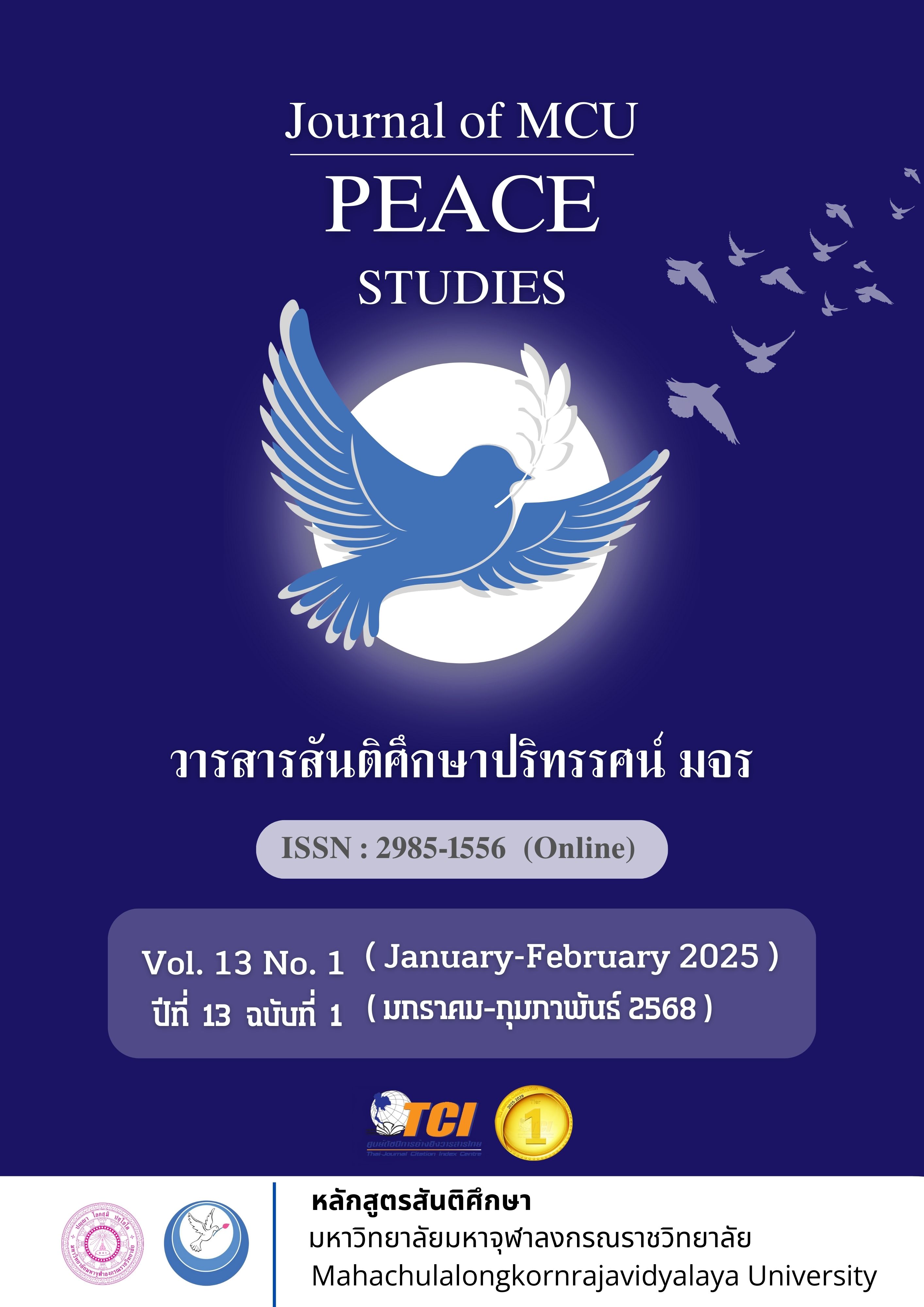The Process of Developing Elderly Peoples as Mediators in Disputes through Buddhist Peaceful Means
Main Article Content
Abstract
The study had the following objectives: 1) to investigate the problems, needs, and concepts related to the development of elderly people as mediators in disputes based on modern science; 2) to analyze the Buddhadhamma that supports the process of developing elderly people as mediators; and 3) to develop and present a process for training elderly people as mediators in disputes through Buddhist peaceful means. The study was conducted under the framework of the Four Noble Truths (Ariyasacca), utilizing the 9-Ladder Approach of the Peace Studies Program at the Graduate School, Mahachulalongkornrajavidyalaya University.
The study found the following results: 1) The challenges faced by elderly mediators in resolving disputes included: (1) Elderly mediators often lack knowledge and understanding of inner mediation (inner peace), focusing primarily on external mediation; (2) Elderly individuals who are registered as mediators lack practical experience, leading to insufficient confidence in their mediation skills; (3) Elderly mediators lack knowledge of the correct and systematic procedures for mediating disputes; (4) Elderly mediators lack professional techniques and methods for effective mediation; and (5) Elderly mediators often fail to draft accurate and proper memorandum agreements. 2) The Buddhist peaceful means that support the process of developing elderly people as mediators include the Threefold Training (Tisikkhā), which focuses on cultivating the qualities necessary for elderly mediators and enhancing their ability to conduct professional mediation through a systematic analysis of conflicts. The outcomes of developing elderly mediators can be assessed through the principles of the Four Developments (Bhāvanā), which encompass physical, moral, emotional, and intellectual aspects. 3) The process of developing elderly people as mediators in disputes through Buddhist peaceful means resulted in the creation of the ‘MEDR Model,’ which consists of the following six steps: (1) establishing a safe zone; (2) identifying the standpoint of each party; (3) generating alternatives to resolve deadlocks; (4) uncovering true needs through deep listening; (5) finding common ground that satisfies all parties; and (6) maintaining relationships.
Article Details

This work is licensed under a Creative Commons Attribution-NonCommercial-NoDerivatives 4.0 International License.
Views and opinions expressed in the articles published by The Journal of MCU Peace Studies, are of responsibility by such authors but not the editors and do not necessarily reflect those of the editors.
References
Department of Older Persons, Ministry of Social Development and Human Security. (2023). 5-Year Action Plan (2023-2027). Retrieved February 21, 2023, from https://www.dop.go.th/download/laws/th1691739659-845_0.pdf
Dispute Resolution Promotion Division, Department of Rights and Liberties Protection. (2019). Report on the Implementation of the Mediation Act B.E. 2019. February 25, 2023, from https://catalog.rlpd.go.th/sk/organization/pcd_os_dataset
Nithiphanyangsong, T. (2021). Development of the Dispute Mediation Process during Investigation Stage by Buddhist Peace Method in Phuket Province. (Doctoral Dissertation). Mahachulalongkornrajavidyalaya University. Phra Nakhon Sri Ayutthaya.
Phra Brahmapundit (Prayoon Dhammachitto). (2010). Integrating Buddhism with Modern Sciences: Buddhism and National Reconciliation. Retrieved March 12, 2023, from https://www.mcu.ac.th/article/detail/435
Phramaha Hansa Dhammahaso (Nithibunyakorn) (2013). Religious Principles and Dispute Mediation. Bangkok: Active Print Co., Ltd.
The Peace Studies and Good Governance Institute, King Prajadhipok's Institute. (2019). Training Program and Manual for Training Personnel to Register as Mediators under the Dispute Mediation Act, B.E. 2019. Retrieved March 12, 2023, from https://www.kpi.ac.th/
The WHOQOL Group. (1995). The World Health Organization Quality of Life assessment (WHOQOL): Position Paper from the World Health Organization. Social Science & Medicine, 41(10), 1403-1409.
Wasi, P. (2000). Desirable Quality of the Elderly. Bangkok: Chulalongkorn University.
Watthanatsap, W. (2012). Conflict: Principles and Tools for Problem Solving. (4th ed.). Khon Kaen: Khlangnana Wittaya Press.


